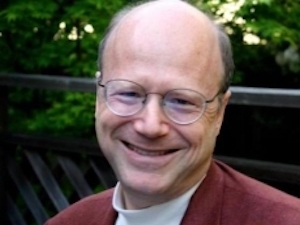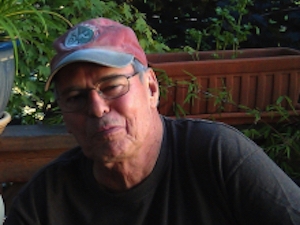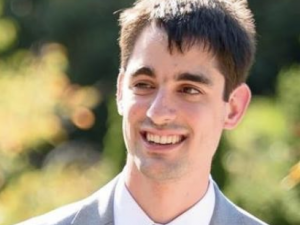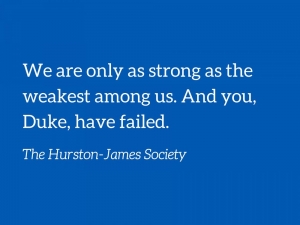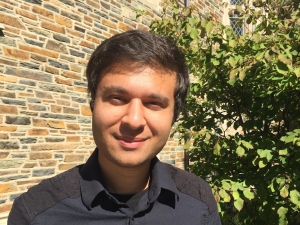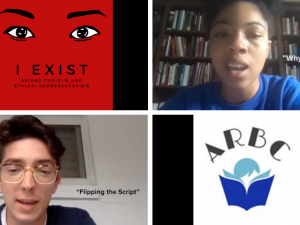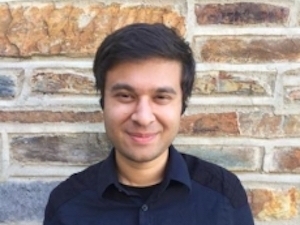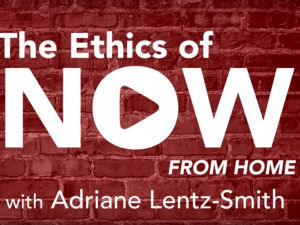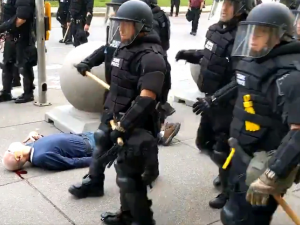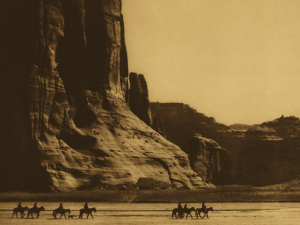The recent protests over police killings of Black men, and the reaction to those protests by some white Americans, underscores a massively polarized electorate heading into the November election. But to what extent is the nation truly divided, and which voting blocks might play key roles? Three Duke scholars discussed these topics and more Wednesday during a virtual media briefing. Watch the briefing on YouTube. Here are excerpts: ON DISTINCTION BETWEEN WHITE IDENTITY AND WHITE RACIAL DISCRIMINATION… read more about How Racial Identity and Polarization Could Influence the Election »
Malachi Hacohen’s book, Jacob & Esau: Jewish European History Between Nation & Empire (Cambridge University Press, 2019) has been awarded the 2020 Biennial Book Prize by the Center for Austrian Studies. Hooray. The citation for the award reads, While demonstrating the ways in which Jewish history was inextricably linked with the history of Europe as a whole, Hacohen’s narrative also underscores the enduring significance of rabbinic culture and Jewish religious… read more about Malachi Hacohen's book awarded the 2020 Biennial Book Prize by the Center for Austrian Studies »
Thavolia Glymph's book, The Women's Fight" The Civil War's Battle for Home, Freedom, and Nation, is one of five books recommended to "help to inform the present moment by showing how African Americans have long navigated the informal and formal structures of racism in their battle for civil rights and social justice". read more about Thavolia Glymph's book named "The Five Best Books on the African-American Civil War Experience" »
To prepare for the fall semester, the Department of History formed an ad hoc committee, to create a "set of best practices for teaching online and reviewing syllabi to see if there were opportunities for increased engagement for online students. " Members of the team consisted of faculty and graduate students. read more about Dedicated Devils: History Department Committee Helps Faculty Find New Opportunities Amid COVID-19 »
Prof. John French's new book, “Lula and His Politics of Cunning: From Metalworker to President of Brazil," follows Lula from a young man, to the founder of Brazil’s Workers’ Party. read more about Professor John French on Lula, Former Brazilian President (and the Country’s COVID-19 Problem) »
Although he left office nearly a decade ago, the man known to millions simply as Lula remains Brazil’s single most influential politician, says John French, Duke professor of history. Luiz Inácio Lula da Silva led strikes against the country’s military dictatorship, founded the Workers’ Party and became president of Latin America’s largest country after his fourth attempt at election in 2002. Lula has spoken out against the right-wing incumbent President Jair Bolsonaro, who has downplayed the COVID-19 pandemic and… read more about Professor John French on Lula, Former Brazilian President (and the Country’s COVID-19 Problem) »
Dr. Charles Bergquist, the distinguished Latin Americanist labor historian, passed away last month. After earning his PhD at Stanford, he came to Duke where he rose to the rank of full professor. In 1989, he returned to his alma mater, the University of Washington. You can read his memoriam from the University of Washington here. read more about In Memoriam: Professor Emeritus Charles Bergquist »
On the occasion of World Photography Day, the Alkazi Foundation is pleased to announce its collaborative project with the Department of History, Duke University on a rare album ‘Collections of Photographs of Old Congress Party- K.L. Nursey’. As part of the ongoing research, this short clip features Prof. Sumathi Ramaswamy (James B. Duke Distinguished Professor of History, Duke University) and Avrati Bhatnagar (Ph.D. Candidate, Department of History, Duke University) providing an overview of this unpublished album. … read more about Words of Light on the Streets of Disobedience in Bombay, 1930-1931 »
Adriane Lentz-Smith, an associate professor of History, joined WRAL to discuss the significane of Harris as the first Black woman on a major party's presidential ticket. Watch the video at WRAL. read more about Duke University Expert Weighs in on Selection of Kamala Harris as Biden's Running Mate »
PhD candidate, Ayanna Legros, was awarded one of the 2020 Haitian American Leadership Award Scholarships. read more about Ayanna Legros Awarded 2020 Haitian American Leadership Scholarship »
Adriane Lentz-Smith, associate professor of history and African American studies, was quoted in The Philadelphia Inquirer about the importance of language in reinforcing racial biases in culture. Lentz-Smith also cautions that changing language shouldn't be mistaken for real structural change. read more about Is the word ‘picnic’ racist? »
History Ph.D. Candidate Travis Knoll has been recognized by the Social Science Research Council (SSRC) for his new documentary tracing the incredible campaign of Catholic-inspired Black movement activists in Rio de Janeiro's urban periphery to expand education access to Brazil's political minorities. This campaign changed Brazilian society's discussion of race in the process. SSRC recently spotlighted Knoll’s work in its newsletter. Written and produced by one of Brazil's most prominent Black journalists and… read more about History Graduate Student’s Documentary Work Gains Recognition »
What cancelled summer plans—and new ones—say about the Duke student body. One was supposed to be saying goodbye to her childhood home on the other side of the Atlantic. Another was meant to be working with refugees in Ireland. Two more had plans for research projects in Africa. None of it happened. With international travel grounded thanks to COVID-19, all of the plans that Duke students carefully laid for the summer came apart at the seams. But Duke’s inherently global nature remains—evident in its diverse student body… read more about Purpose from Disruption »
"As we honor Juneteenth and the spirit of emancipatory power, we free ourselves by freeing our language to speak back openly to recent communications regarding the loss of Black lives." The Hurston-James Society wrote an open letter which was published in The Chronicle on June 19, 2020. Six of the signers are History graduate students: Aaron Colston, Tayzhaun Glover, Reina Henderson, Ayanna Legros, Joshua Strayhorn, and Kristina Williams. "The Hurston-James Society is a forum of scholarship and… read more about Juneteenth: An open letter to Duke »
History graduate student, Jacqueline Allain, talks history, teaching, and the Duke Graduate Summer Academy. You can read the full article here. read more about A Love of History and a Passion to Teach »
PhD Candidate Mohammed S. Ali recently placed an essay with the journal History and Theory. The essay is titled "Marking Time and Writing Histories" and asks historians to create new ways of expressing the multiplicity of time instead of relying on the Anno Domini or Common Era dating schemes in their work. The essay is scheduled for publication in the June 2021 issue. read more about Mohammed Ali placed a journal article in History and Theory »
Duke History alum, Cynthia Greenlee, shares a personal insight of her father's dementia and surviving segregation. You can read the article at The Guardian. read more about Trauma and triumph: my father, his dementia and surviving segregation »
Travis Knoll expected to be in Brazil this summer. A Ph.D. student in History, he planned to visit film and Catholic Church archives to further his work on the relationship between Catholic thought, modern Black movements and education policy. But COVID-19 intervened. Recognizing that many students’ plans for teaching, research trips and in-person internships were overturned, Provost Sally Kornbluth and Executive Vice Provost Jennifer Francis pledged that Duke would provide employment opportunities for Ph.D. students who… read more about Changing Their Summer Plans, Duke Ph.D. Students Find New Options for Virtual Employment »
Prof. Thavolia Glymph's book, Out of the House of Bondage is cited in "Juneteenth and emancipation in America: Your weekly guide to the best in books". read more about Thavolia Glymph's book cited in "The Atlantic" »
Prof. Gunther Peck, Director of the Hart Leadership Program, spotlights some of the work his students in the Democracy have been doing this summer in a letter to the Duke community. He highlights "some of the extraordinary history work that our students have been leading and instigating, using the past to make the present both coherent and livable. All of these students are members of the class of 2021 and are majoring in public policy. And all have expanded my sense of hope in this dire and extraordinary moment." You can… read more about Gunther Peck shares inspiring work of Duke undergrads in letter »
Against a backdrop of dual crises of public health and racial justice, more than 50 Black faculty, staff and students shared personal stories of racism and discrimination, presented research on racial inequities, and issued urgent calls for change. The day-long symposium, Living While Black, was attended by more than 6,300 members of the Duke community via videoconference. It addressed the national crises of the COVID-19 pandemic, which is disproportionately affecting communities of color, and the spate of police… read more about Living While Black: Raw Discussions on Race at Duke and in America »
In this article, Anderson Hagler talks about his new course, Disease through the Ages. The current pandemic pushed Anderson to reflect on the social and cultural impact of diseases over time. He realized that students could use their shared experiences of COVID-19 to analyze historically marginalized individuals like lepers and prostitutes and the policies used to treat these perceived contagions such as quarantine and exile. read more about 3 Summer Courses Show What Goes Into Planning a Duke Class »
By the time Summer Session I started on May 13, Duke’s educators had already been at work for weeks. Before a class can be taught, it must be planned. There are readings to select, assignments to create, questions to prepare, schedules to set. And this year, there was an additional challenge: the professors, instructors and Ph.D. students tasked with teaching undergraduates had to adapt their classes for a completely remote term, thanks to the impacts of COVID-19. There was also more demand than ever. With stay-at-home… read more about 3 Summer Courses Show What Goes Into Planning a Duke Class »
PhD Candidate Mohammed Ali published an article in the journal Rhizomes: Cultural Studies in Emerging Knowledge. The article is titled "Ethical Archetypes in Environmental Histories" and analyzes the different tropes environmental historians have used to raise the ethical stakes of environmental destruction. The article is available here: http://rhizomes.net/issue36/ali/index.html read more about Mohammed Ali published a journal article in "Rhizomes: Cultural Studies in Emerging Knowledge" »
In a lunch-hour conversation on Friday, June 5, the Kenan Institute for Ethics’ signature series, The Ethics of Now from Home broke from its weekly webinar schedule to quickly respond to George Floyd’s murder, racism, police violence, and public demonstrations happening all across the nation. In the conversation, “Racism, Police Violence, and Protests,” series host Adriane Lentz-Smith (Associate Professor of History), was joined by William A. “Sandy” Darity Jr. (Samuel DuBois Cook Distinguished Professor of Public… read more about Racism, Police Violence, and Protests »
Laura Edwards, Peabody Family Distinguished Professor of History, argues that protesters have a right to oversight on police powers, and that the right has deep roots in Anglo-American law. Read her article at the Washington Post. read more about The Constitution Demands Police Accountability »
Broad criminal justice reform is needed to change policing in the United States, and it should originate at the local level, Duke scholars said Thursday. Three Duke experts spoke to media Thursday about a variety of policy and reform issues as well as about what can be learned about policing at the nation’s founding. Here are excerpts: ON POLICING, DEADLY FORCE AND REFORM Brandon Garrett, law professor “Police in America have incredibly broad discretion to use deadly force. About 1,000… read more about Reimagining the Criminal Justice System »
"COVID-19 is Devastating Native American Communities. History Illuminates Why." was written collectively by Pete Sigal, Robbie Ethridge and Nancy Shoemaker, presidents of the American Society for Ethnohistory. It is published in the History News Network. read more about Pete Sigal co-authors op-ed in the History News Network »
Statement of Solidarity The Department of History stands in solidarity with all Black members of our community at Duke and in Durham in this searing moment of crisis when systemic racism and structural inequalities have once again come to the fore. We stand with all those who are exercising their constitutional right to assemble and are speaking out in our nation’s tradition of public protest and nonviolent civil disobedience. And we express our gratitude to peoples across the globe who are making common cause… read more about Black Lives Matter Statement of Solidarity »
Even with seemingly convincing video evidence, prosecutors may struggle to convict a former Minnesota police officer charged with the third-degree murder of a man he was restraining, a Duke law scholar said Tuesday. Duke law professor James Coleman Jr. said the case against Derek Chauvin may come down to a jury’s interpretation of precisely what caused the death of George Floyd, who Chauvin restrained with a knee hold for nearly nine minutes. Chauvin is white, Floyd was black, and the incident led to mass race protests in… read more about Duke Scholars Examine Protests and Police Conduct »


